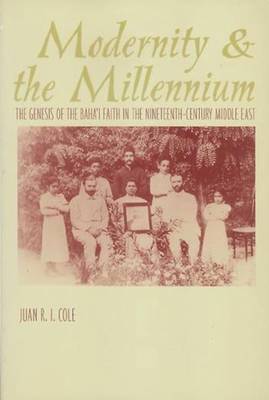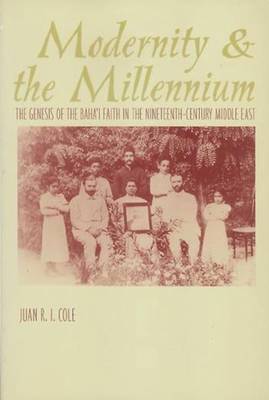
- Afhalen na 1 uur in een winkel met voorraad
- Gratis thuislevering in België vanaf € 30
- Ruim aanbod met 7 miljoen producten
- Afhalen na 1 uur in een winkel met voorraad
- Gratis thuislevering in België vanaf € 30
- Ruim aanbod met 7 miljoen producten
Omschrijving
Modernity and the Millennium is the first book to chart responses in the Muslim Middle East to modernity through an examination of the evolution of the Baha'i faith--a millenarian movement led by the nineteenth-century Iranian prophet Baha'u'llah ("the Glory of God"). This volume illuminates the complexity and ambiguity that characterized the changing relationship of Baha'u'llah and his followers to modernity, considered as a transnational and fluid political and cultural field of contestation. The insights presented here into these responses to modernity illuminate not only the genesis of a new world-religion but also important facets of Middle Eastern-particularly Iranian-social and cultural shifts in the nineteenth century.
Drawing on the work of Habermas, Giddens, Touraine and Bryan Turner, among others, Juan R. I. Cole considers some of the ways in which Middle Eastern society was affected by five developments central to modernity: the lessening entanglement of the state with religion, the move from absolutism to democracy, the rise of sovereign nation-states, the advent of nationalism, and the women's movement. He explores the Baha'is' positive response to religious toleration, democracy, and greater rights for women and their "utopian realist" critique of nationalism, militant Jacobin secularization, industrialized warfare, and genocide, oppression of the poor and working classes, and xenophobia.Specificaties
Betrokkenen
- Auteur(s):
- Uitgeverij:
Inhoud
- Aantal bladzijden:
- 400
- Taal:
- Engels
- Reeks:
Eigenschappen
- Productcode (EAN):
- 9780231110815
- Verschijningsdatum:
- 1/05/1998
- Uitvoering:
- Paperback
- Formaat:
- Trade paperback (VS)
- Afmetingen:
- 154 mm x 229 mm
- Gewicht:
- 408 g

Alleen bij Standaard Boekhandel
Beoordelingen
We publiceren alleen reviews die voldoen aan de voorwaarden voor reviews. Bekijk onze voorwaarden voor reviews.











